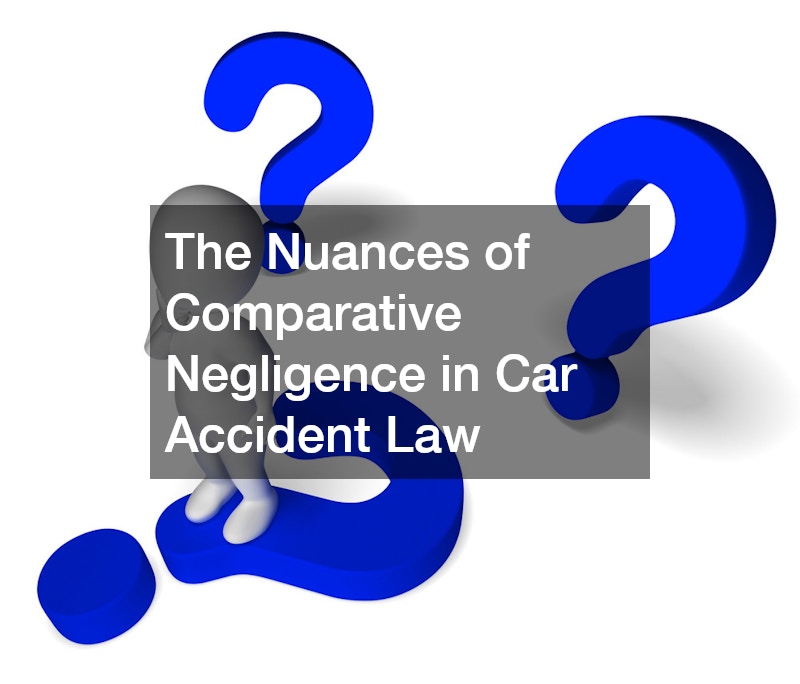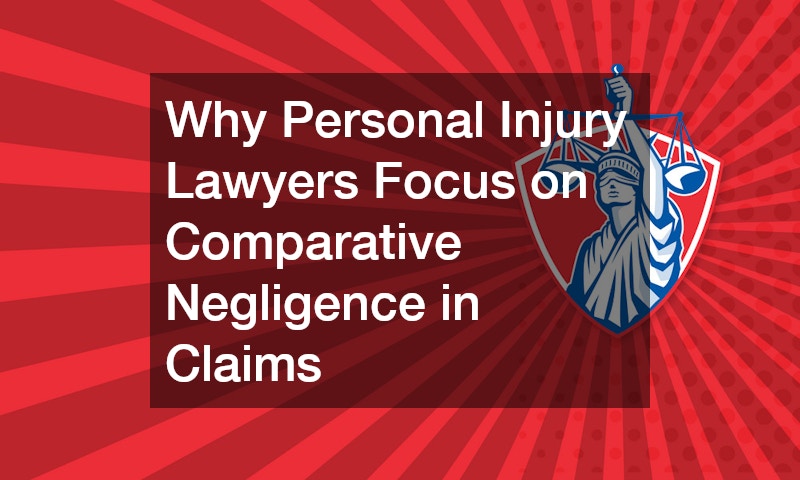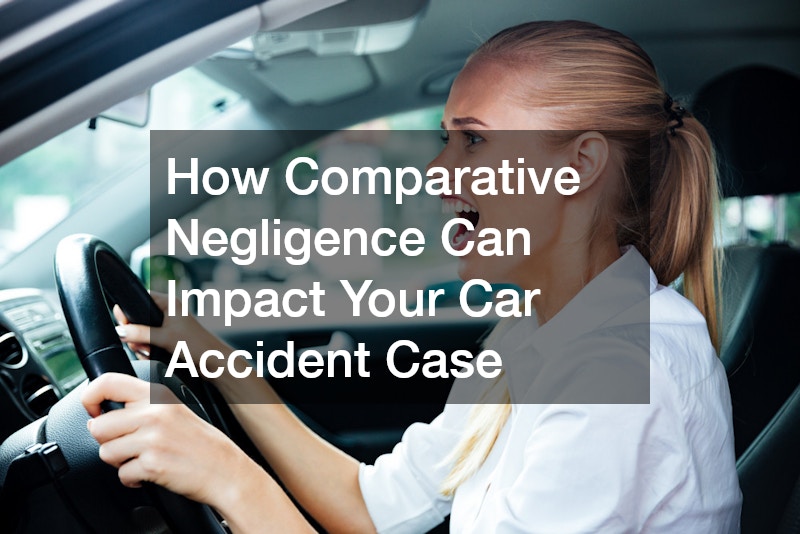Disclaimer: This website shares legal information for educational purposes only and does not constitute legal advice. Please consult a licensed attorney for advice specific to your situation.
In the complex world of car accident law, understanding the concept of comparative negligence can significantly influence the outcome of your car accident case. Comparative negligence is a legal principle that allows for the distribution of fault among parties involved in an accident. By examining the role of comparative negligence, victims can better grasp how their potential compensation might be affected.
Knowledge of comparative negligence is essential as it can directly impact the amount of damages awarded in a car accident case. This legal doctrine is particularly significant in states that do not follow a pure contributory negligence rule, which would otherwise bar recovery if the victim contributed even slightly to the accident. As car accident cases often involve multiple factors and parties, understanding comparative negligence will empower victims to make informed decisions.
This article delves deeply into the nuances of comparative negligence in car accident cases. We’ll explore how local lawyers can illuminate the process and why personal injury lawyers emphasize this legal concept in claims. Additionally, we’ll cover the importance of gathering evidence and the crucial role of medical records in establishing fault.
The Nuances of Comparative Negligence in Car Accident Law

In car accident law, comparative negligence is a doctrine that allocates fault among different parties based on the degree of their negligence. Essentially, it recognizes that more than one individual or entity might have contributed to the car accident. How fault is shared impacts both the liability and the damages involved in a car accident case.
There are two primary forms of comparative negligence: pure and modified. Pure comparative negligence allows parties to recover damages proportional to their fault, while modified comparative negligence places a threshold, often 50% or 51%, above which a party cannot recover any damages. Each state’s adherence to one of these systems affects how car accident cases unfold in that jurisdiction.
For car accident victims, understanding these nuances is key as it dictates the potential liability and financial outcomes of their case. It is essential to work with experienced personal injury lawyers who can explain how comparative negligence laws apply to their unique situations and guide them through the legal process.
How Local Lawyers Can Help You Understand Comparative Negligence

Local lawyers are crucial in helping victims navigate the intricacies of comparative negligence within specific state jurisdictions. Their deep understanding of local statutes and case law allows them to evaluate each client’s car accident case accurately. By availing themselves of local expertise, victims can gather insights into how their cases might be perceived in court.
Local lawyers can also assist in preserving and presenting evidence that adequately demonstrates the appropriate distribution of fault. They know which evidence is most persuasive and which aspects of a client’s behavior before, during, and after the accident may impact the case. Consequently, their role is indispensable in forming an effective legal strategy aimed at maximizing a victim’s compensation.
Moreover, local lawyers are usually well-acquainted with the tendencies of local judges and insurance adjusters. This familiarity can be advantageous when negotiating settlements or advocating for a client’s rights during trial. As such, they can leverage their local knowledge to tip the balance in favor of the client in car accident cases presenting elements of comparative negligence.
The Role of Medical Records in Establishing Negligence After an Accident

Medical records play a pivotal role in establishing negligence in the aftermath of a car accident. They provide concrete evidence of the injuries sustained, thereby demonstrating the severity and impact of the accident on the victim’s life. In a car accident case, having detailed medical documentation can significantly aid in corroborating the victim’s account of the incident.
Such records are valuable in making the connection between the injuries and the accident, refuting any assertions that injuries were pre-existing or occurred post-accident. For example, immediate attention at urgent care clinics ensures that injuries are documented timely and accurately, reinforcing claims of negligence against the other party. The presence of whiplash treatment records, for instance, can be vital in pursuing claims related to soft tissue injuries.
Furthermore, accurate medical records help personal injury lawyers calculate the appropriate compensation for pain, suffering, medical expenses, and rehabilitation costs. A well-documented car accident case featuring comprehensive medical records increases the likelihood of a favorable settlement or court judgment, highlighting the severity of the incident.
Why Personal Injury Lawyers Focus on Comparative Negligence in Claims

Personal injury lawyers place considerable emphasis on the principle of comparative negligence because it is a key determinant of compensation outcomes. Understanding how negligence is distributed in a car accident case enables attorneys to devise strategies that optimize their clients’ claims. They assess all evidence, such as witness statements and accident scene reconstructions, to determine fault accurately.
By highlighting the degree and proportion of fault, personal injury lawyers can argue for the maximization of damages payable to their clients. This legal perspective ensures that those responsible contribute fairly to the victim’s recovery, fitting the parameters set by local car accident law. Lawyers endeavor to shield their clients from undue blame, thereby protecting their entitlements to compensation.
Additionally, comparative negligence analysis plays a vital role during settlement negotiations. Here, personal injury lawyers advocate for a settlement that reflects the true dynamics of the accident, effectively countering any attempts by opposing parties to downplay their liability. Thus, focusing on comparative negligence becomes a central pillar in securing equitable results for their clients.
Navigating Insurance Challenges in Comparative Negligence Cases
One of the daunting aspects of dealing with comparative negligence in car accident cases is navigating the challenges posed by insurance companies. Insurers often aim to minimize payouts, trying to assign a higher degree of fault to victims to reduce their liability. Understanding these tactics helps victims protect their rights throughout the claims process.
Personal injury attorneys work diligently to confront these challenges, utilizing various negotiation and litigation strategies. They ensure that understanding of the comparative negligence laws informs all interactions with insurers, strengthening the overall car accident case. By taking charge of the communication, lawyers help their clients avoid common pitfalls that could jeopardize their compensation claims.
Moreover, being armed with professional legal representation prevents companies from exploiting uninformed victims. With adept negotiation and thorough knowledge, accident law firms counter insurance strategies aimed at diminishing compensation based on alleged negligence. Thus, having experienced representation levels the playing field when dealing with formidable insurance entities.
The Significance of Medical Treatment in Whiplash and Negligence Claims
The significance of seeking medical treatment promptly after a suspected whiplash injury cannot be understated in negligence claims related to car accidents. A timely evaluation not only provides necessary medical care but also establishes a clear link between the accident and the resulting injuries, pivotal for car accident cases. Whiplash treatment records offer concrete evidence to support claims of soft tissue injuries.
The detailed documentation from medical practitioners provides personal injury attorneys with evidence to argue against any insurance claims that the injury was pre-existing. The sooner treatment is sought, the stronger the evidence becomes in correlating with the events of the accident. Therefore, consulting urgent care clinics swiftly following an accident is an optimal course of action.
Treatment records, especially for injuries commonly associated with car accidents, are crucial in substantiating negligence and refuting attempts to undermine the victim’s claims. By proving that injuries were both significant and resultant from the accident, victims can bolster their car accident case, eventually leading to favorable outcomes in their pursuit of fair compensation.
How Accident Law Firms Tackle Complex Comparative Negligence Issues
Accident law firms are equipped with specialized skills and experience to address the complexities inherent in comparative negligence cases. They utilize comprehensive investigation practices to discern the levels of fault among all parties involved. This investigative process often includes accident reconstructions, gathering surveillance footage, and acquiring expert testimonies that clarify the events leading to the collision.
Moreover, these firms apply strategic legal frameworks to isolate arguments that bolster the victims’ positions, mitigating any attempts to unjustly inflate their liability. By presenting a balanced and evidence-based narrative, they strive to ensure that clients receive fair compensation proportional to their actual responsibility in the car accident case.
A vital component of their efforts is continuous communication with their clients, addressing any concerns about the proceedings. This reassurance, coupled with transparency about legal strategies, assists victims in understanding how comparative negligence may influence their case outcomes, ultimately supporting their journey toward resolution.
Gathering Evidence: Key Strategies for Proving Your Case
Gathering robust evidence is fundamental in laying the groundwork for a strong car accident case. Comprehensive evidence collection ensures that all aspects of the accident are portrayed accurately and convincingly. Components of strong evidence gathering include obtaining police reports, witness statements, photographic evidence, and any other relevant documentation.
Deploying digital resources, such as traffic cameras and other surveillance footage, can significantly bolster a case by providing unbiased recordings of the incident. Personal injury attorneys focus on acquiring these resources quickly to circumvent potential loss or alteration of materials. Ensuring authenticity helps in presenting irrefutable evidence in court.
Further, accident victims are encouraged to maintain thorough personal records of the accident and their subsequent recovery. This documentation might include personal accounts, medical bills, and records from urgent care clinics, all essential in establishing a clear narrative of events and illustrating the comprehensive impact of the accident on their lives.
What Personal Injury Attorneys Wish You Knew About Comparative Negligence
Personal injury attorneys often wish their clients understood the profound impact of comparative negligence on their car accident case. Awareness of this legal concept allows clients to comprehend why their fault percentage, if any, crucially informs the compensation process. It underscores the need for transparency and honesty when discussing accident details with legal advisors.
Attorneys also hope clients recognize the value of prompt medical attention and meticulous documentation of all accident-related expenses and occurrences. Such diligence is instrumental in substantiating their claims and fortifying their bargaining position during negotiations. In contexts like urgent care clinics, immediate visits can provide an initial layer of indispensable proof.
Recognizing the importance of cooperation with legal representatives, clients can better appreciate how leveraging their attorneys’ expertise in comparative negligence law can dictate the difference between a successful or unsuccessful claim. Legal guidance sheds light on the evidence needed to navigate their case efficiently towards an optimal resolution.
The Impact of Legal Issues on Your Car Accident Case Outcomes
Legal issues significantly impact the outcomes of car accident cases, with comparative negligence playing a central role. Factors such as statutes of limitations, strict liability, and probation violations can alter the legal landscape, affecting case outcomes and compensation amounts. Understanding these issues is critical to developing a robust case strategy. If you’re arrested for a car-accident-related offense, be sure to keep 24 hour bail bondsmen on call for assistance along with a local criminal attorney, though you should always keep in mind that if a plaintiff has a history of legal issues, such as probation violations or bail situations, it might affect how their credibility is perceived in a negligence case.
Personal injury attorneys help navigate legal hurdles by addressing any compliance-related requirements promptly, preventing potential setbacks. Their influence ensures clients’ claims are not compromised by procedural errors, thus safeguarding their entitlement to fair compensation.
Additionally, attorneys emphasize preemptively managing issues that might arise at later stages, such as appeals and additional litigation risks. Their insights and forethought provide clients with assurances as they navigate the multifaceted legal proceedings associated with car accident cases.
Understanding the Importance of Documentation in Your Claim
Thorough documentation serves as the backbone of any successful car accident case. It substantiates claims and provides a factual basis for the evaluation of fault and compensation. Proper record-keeping addresses any potential questions regarding the chain of events leading to the accident.
Further, documentation empowers attorneys to craft compelling arguments that highlight their clients’ perspectives effectively. It enriches negotiation landscapes, clarifying any outstanding issues around fault distribution and injuries sustained. As a result, leveraging impeccable documentation strengthens victims’ claims for rightful compensation.
Moreover, proactively documenting and organizing information can expedite the legal process, offering a clearer path to resolution. Ensuring documentation completeness benefits interactions with both insurance companies and legal professionals, ultimately influencing the overall trajectory and success of a car accident case.
How Timely Medical Care Can Influence Your Case’s Negligence Determination
Timely medical care post-accident is vital in influencing the determination of negligence in a car accident case. Immediate assessments offer clarity into injuries’ severity and causation, essential elements in building a legal strategy. Visiting an urgent care clinic delivers tangible proof of injuries, counteracting any claims of minor impact.
Prompt medical attention not only safeguards well-being but also encapsulates critical data regarding how injuries correlate with the accident. With concrete medical documentation, personal injury lawyers can more effectively argue against undervaluation tactics employed by insurance adjusters.
Additionally, quick interventions prevent opponents from disputing the timing and origin of injuries, fortifying the victim’s legal stance. Therefore, recognizing the crucial role of immediate medical care in the context of negligence builds a strong case for ensuing legal proceedings.
Strategies to Strengthen Your Position in a Comparative Negligence Dispute
Improving your position in a comparative negligence dispute involves strategic legal maneuvers and comprehensive preparation. Engaging an experienced personal injury attorney ensures that expert knowledge is applied to interpret negligence laws accurately. This expertise is vital in translating how intricate legal principles practically apply to each individual car accident case.
Additionally, assembling undisputable evidence, like witness accounts and detailed accident scene documents, underpins solid arguments. Ensuring all evidence is organized and accessible significantly influences how cases are perceived in court or during settlement talks, solidifying the veracity of claims.
Active participation in legal strategizing with your lawyers also strengthens your case, particularly when negotiating settlements. Open discussions about case goals and potential outcomes between victims and their attorneys help clarify expectations and align case strategies with tangible, desired results.
Navigating the complexities of car accident cases necessitates a thorough understanding of comparative negligence and its effects on legal outcomes. With the guidance of local lawyers and personal injury attorneys, victims gain insight into distributing fault appropriately and strategize legal action accordingly. By prioritizing evidence collection and documentation, victims can bolster their cases and advocate forcefully for fair compensation.
In tandem with legal support, timely medical care and comprehensive records play a pivotal role in solidifying claims, particularly in cases involving whiplash and similar injuries. The interplay between medical documentation and legal proceedings underscores the fragile balance required for success in comparative negligence disputes.
Ultimately, the blend of adept legal representation, informed insights, and strong documentation dictates prevailing in car accident law complexities, echoing the necessity for proactive legal and medical adherence. Leveraging these strategies sets the foundation for favorable outcomes in your car accident case, ensuring justice and equitable restitution.


